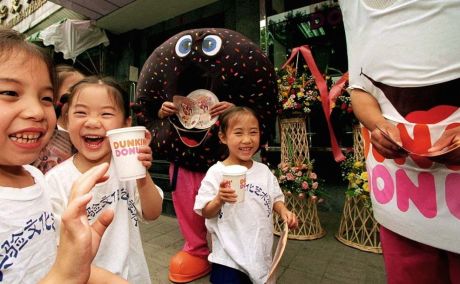

Big brands, including Burger King, Dunkin Donuts, KFC, Kraft Foods and MillerCoors, are wasting billions of dollars worth of valuable materials because they sell food and drinks in subpar packaging, according to a comprehensive new report on packaging and recycling by the fast food, beverage, consumer goods and grocery industries.
The 62-page rank-‘em-and-spank-‘em study, Waste and Opportunity 2015, was published Thursday by advocacy nonprofits As You Sow and the Natural Resources Defense Council. They found that few companies have robust sustainable packaging policies or system-wide programs to recycle packages. Indeed, no company was awarded their highest rating of “best practices.”
The environmental groups did identify a number of leaders, albeit flawed ones. In the beverage industry, New Belgium Brewing, Coca-Cola, Nestlé Waters and PepsiCo won praise. Starbucks and McDonald’s are said to be a cut above their competitors in fast food and quick-serve restaurants. As for consumer goods companies and grocery stores, the report offers qualified praise for Walmart, Procter & Gamble, Colgate-Palmolive and Unilever.
Broadly, though, this study paints a discouraging picture. What progress has been made is incremental and spotty, not comprehensive. As often than not, single-use packages of food and drinks are made from virgin materials and then tossed in the trash.
As the report notes, with an overall recycling rate of 34.5% and an estimated packaging recycling rate of 51%, the United States lags behind many other developed countries. Less than 14% of plastic packaging — the fastest-growing form of packaging — is recycled. Recyclable post-consumer packaging with an estimated market value of $11.4bn is wasted annually.
“Brand leadership is sorely lacking,” said Conrad McKerron, a senior vice president of As You Sow and a report author, at a news conference releasing the report Thursday. “This all comes down to responsibility. Brands will tell us, ‘we’re not in the waste business.’ We think that, in the future, this is a part of corporate stewardship that needs to happen.”
Some companies are even moving backwards. The report decries the rapid growth of flexible, layered plastic packaging that is not recyclable, citing Kraft’s Capri-Sun juice pouches as an example: “If all Capri Sun pouches discarded annually in the United States were laid end to end, they would circle the earth nearly five times; they would also entirely cover the land area of California and Texas,” the report says.
On the other hand, Honest Tea, a unit of Coca-Cola, has said that in response to concerns about the recyclability of pouches, it would shift its Honest Kids organic juice packaging towards aseptic containers, which are also composites but can be more easily recycled. “This is encouraging news,” McKerron said.
Other activities deemed praiseworthy by the report included:
- Starbucks’ promise to serve 25% of all beverages in its stores in reusable mugs or tumblers by 2015, even though the coffee giant backtracked, saying it would reach only 5%. Starbucks uses 10% postconsumer recycled content in its cups, and McDonald’s uses 33% postconsumer recycled content in its sandwich boxes.
- PepsiCo remains the only major beverage company maintaining a consistent amount — at least 10% — of PET content in its containers. PepsiCo and Coca-Cola are both moving forward to introduced plant-based PET bottles.
- Walmart was cited for achieving its commitment to reduce packaging across its global supply chain by 5%, and for its goal of increasing its use of postconsumer recycled plastic in products and packaging by 3bn lbs by 2020. The giant retailer has also backed a $100m loan fund to finance municipal projects to boost recycling, which at least acknowledges responsibility for the problem, McKerron said.
Of the 47 companies surveyed, most were graded as “needs improvement” or “laggards,” for various reasons. Among the restaurants, Dunkin’ Brands, Subway, Chick-fil-A, Chipotle, Panera Bread and Yum! Brands were categorized as “Needs Improvement.” Arby’s, Quizno’s, Burger King, Wendy’s, Jack in the Box, Dairy Queen, Domino’s Pizza and Papa John’s Pizza were identified as “Poor” for showing little to no leadership, based on information they make public.
In the beverage industry, Dr Pepper, Snapple Group, Diageo and Anheuser Busch were categorized as “Needs Improvement.” Heineken, MillerCoors, Boston Beer, and Red Bull were identified as “Poor.”
The report, which is rich in anecdotes as well as data, is intended to prod companies to take a closer look at their practices, especially in light of growing consumer concern about plastics in the ocean. NRDC’s Darby Hoover said food and beverage packaging is a “prime component of the plastic pollution in our oceans and waterways”, and that companies have “an opportunity and an obligation” to curb it.
The circular economy hub is funded by Philips. All content is editorially independent except for pieces labelled ‘brought to you by’. Find out more here.
Source: The Guardian: What a waste: study finds big US brands stuck on disposable packaging, 29.1.2015
The Czech version with more details can be found on the webpage of our CSR partner - A-CSR (link here).
